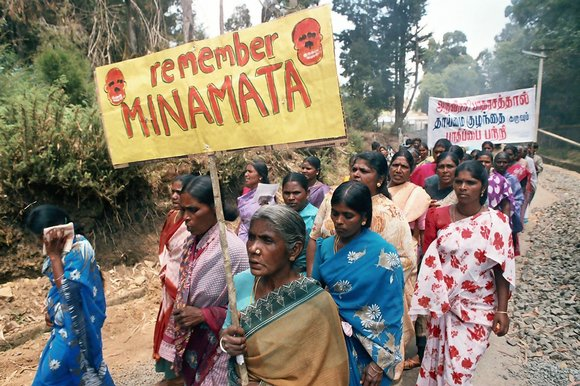From The Sunday Times
Former staff at a Unilever subsidiary want compensation for alleged safety lapses at a thermometer factory in southern India
Protesters in Kodaikanal highlight the UN’s Minamata Convention on Mercury
Every day Daisy Varghese is haunted by the thought that her former job in a factory may have killed her six-year-old son.
Between 1996 and 1999, Varghese, now 35, was a contractor at a mercury thermometer factory run by what is now Hindustan Unilever — a company majority-owned by Unilever, the FTSE 100 consumer goods giant.
She worked in a section close to the factory’s toxic “mercury” area, and claims she was given a coat but no cap, facemask or gloves.
Varghese said she often had stomach pains, which she initially dismissed as nothing serious.
Doctors at the factory in Kodaikanal, a hill station once used by the British as a retreat during sweltering Indian summers, reportedly gave water and pills to those who felt unwell, telling them to sit outside.
She miscarried during her first pregnancy. Her only child, Michael, was born in 2001, and it was soon apparent that all was not right. “He was unable to speak, stand or walk. He could not show any emotion,” she said. Varghese claims at least one local doctor told her the problems could be “mercury related”, but would not put it in writing.
Michael died in 2007, a week after a court-appointed committee visited Kodaikanal, in the southern state of Tamil Nadu, to look into allegations of health and safety shortfalls. His death certificate stated cerebral palsy, which studies have linked to mercury poisoning.
Today, Michael is a symbol for hundreds of former workers who fear that lax safety procedures may have caused serious health problems for them and their offspring.
Their battle will move to Britain this week when campaigners confront Unilever bosses at the annual meeting in Leatherhead, Surrey.
Their presence will be a particular embarrassment for Paul Polman, the chief executive, who claims to have put environmental issues and sustainability at the heart of Unilever’s operations. “Our purpose as a business is about helping to build a world where everyone lives well and within the natural limits of the planet,” the company boasts.
However, Eurig Scandrett, a member of the UK Campaign for Justice in Kodaikanal and a lecturer at Edinburgh’s Queen Margaret University, said: “There is a contradiction between what’s gone on in Kodaikanal and what Unilever promotes itself as. Its publicity claims it has the same standards all over the world and that’s clearly not the case.”
In Kodaikanal last week, a dozen alleged victims contradicted company claims that “comprehensive occupational health and safety systems existed”. All told The Sunday Times that they had received no safety briefings at the plant.
Their symptoms include headaches, dizziness, memory loss, skin infections, kidney disease and infertility. Some brought along their children, alleging that they too had health problems.
